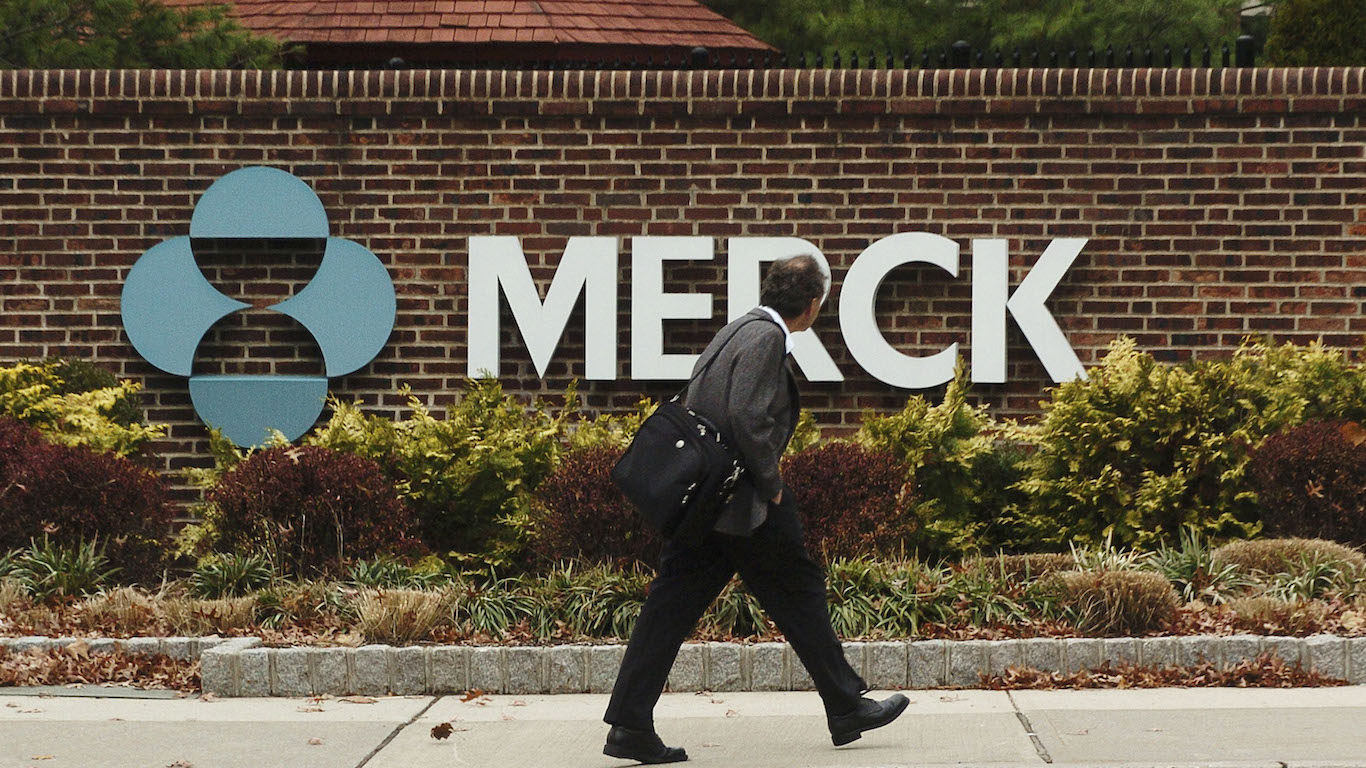Health and Healthcare
High Hopes and Expectations for Merck's First Investor Day in Years

Published:
Last Updated:

Merck & Co. Inc. (NYSE: MRK) may still be up in 2019, and it may be better off for now than rival Pfizer, but the reality is that Merck shares have underperformed the market as the pharmaceutical and health care companies are facing risks that may come sooner rather than later.
Merck is set to host its Investor Day on June 20. Investors will have a high bar of expectations because so much of Merck’s story is known, and the analyst community and recent company data points should come to a head within a week.
24/7 Wall St. has compiled recent data and offered some color around key issues inside and outside of the company. We also tracked analyst activity ahead of the coming event, and more calls are likely to be made going into and after next week’s key event.
According to Credit Suisse, this will be Merck’s first comprehensive Investor Day event since May 2014. Credit Suisse has been bullish on Merck, with an Outperform rating, but with shares close to its $86 target price it means that next week’s event will be critical for the company to lay out a long-term vision. This is also a time when Merck can show how the company is planning to drive additional upside for investors.
Merrill Lynch has a Buy rating and a $91 price objective, and the firm sees the June 20 focus to be on its novel pipeline assets, as the non-Keytruda pipeline is underappreciated in vaccines, primary care, HIV, early IO and more.
JPMorgan reiterated the stock as Overweight and even raised its price target to $93 from $90. CFRA recently reiterated its Buy rating and $88 target on Merck. At the end of May, Goldman Sachs initiated Merck with a Neutral rating. In mid-May, Atlantic Equities raised its rating to Overweight from Neutral.
Below are just some of the issues that Merck’s investors will want to consider ahead of and going into the June 20 Investor Day.
One key drug driving future growth is its blockbuster cancer drug Keytruda. There are other drugs in Merck’s extensive pipeline, and the vaccine franchise will be a focal point as well.
Merck’s Phase 3 pipeline, which will have the shortest timeline to producing revenues (that is if drugs are approved) are in areas such as bacterial pneumonia, heart failure, mesothelioma and just about every form of cancer you can count (and then some more). Merck’s Phase 2 pipeline includes many cancers, as well as diabetes, HIV, schizophrenia and more.
On Keytruda, Merck recently announced that the U.S. FDA approved an expanded use for Keytruda as a monotherapy in patients whose tumors express PD-L1 or in combination with platinum and fluorouracil for the first-line treatment of patients with metastatic or with unresectable, recurrent head and neck squamous cell carcinoma. Merck’s revenues from Keytruda climbed to $2.15 billion in the fourth quarter of 2019 alone.
One issue to consider is that Merck’s initial guidance for all of 2019 already has been set at $4.57 to $4.72 earnings per share (EPS), with full-year revenues in a range of $43.2 billion to $44.7 billion.
Merck also previously squashed the idea that it was in the market for a mega-merger similar to the Bristol-Myers Squibb acquisition of Celgene for more than $70 billion. That said, Merck recently announced that it had entered into a definitive agreement to acquire Tilos Therapeutics for a sum of up to $773 million for its targets in cancer, fibrosis and autoimmune diseases.
Merck also announced at the start of June that the FDA approved its supplemental New Drug Application for the use of Zerbaxa as a treatment of patients 18 years and older with hospital-acquired bacterial pneumonia and ventilator-associated bacterial pneumonia.
The consensus analyst targets for 2019 are $4.74 in EPS and $44.7 billion in revenues. Those targets for 2019 are $5.31 per share from $47.3 billion in revenues. Merck’s $2.20 annual dividend per share now generates a yield of 2.65%, and if Merck can meet its target, it has more room to raise its dividend ahead.
As a reminder, Merck has been a significant buyer of its own stock. It spent $5.9 billion of its cash in the fourth quarter of 2018 alone to repurchase shares (versus $1.0 billion in the third quarter of 2018) and its total buybacks came to $9.1 billion for 2018 (versus $4 billion in 2017).
Shares of Merck were last seen trading at $82.75, in a 52-week range of $59.80 to $84.27. Its Refinitiv consensus target price is $88.93, and its market cap is $213 billion.
While Merck shares are up just 8.5% so far in 2019, they are up about 33% from this time a year ago.
After two decades of reviewing financial products I haven’t seen anything like this. Credit card companies are at war, handing out free rewards and benefits to win the best customers.
A good cash back card can be worth thousands of dollars a year in free money, not to mention other perks like travel, insurance, and access to fancy lounges.
Our top pick today pays up to 5% cash back, a $200 bonus on top, and $0 annual fee. Click here to apply before they stop offering rewards this generous.
Flywheel Publishing has partnered with CardRatings for our coverage of credit card products. Flywheel Publishing and CardRatings may receive a commission from card issuers.
Thank you for reading! Have some feedback for us?
Contact the 24/7 Wall St. editorial team.